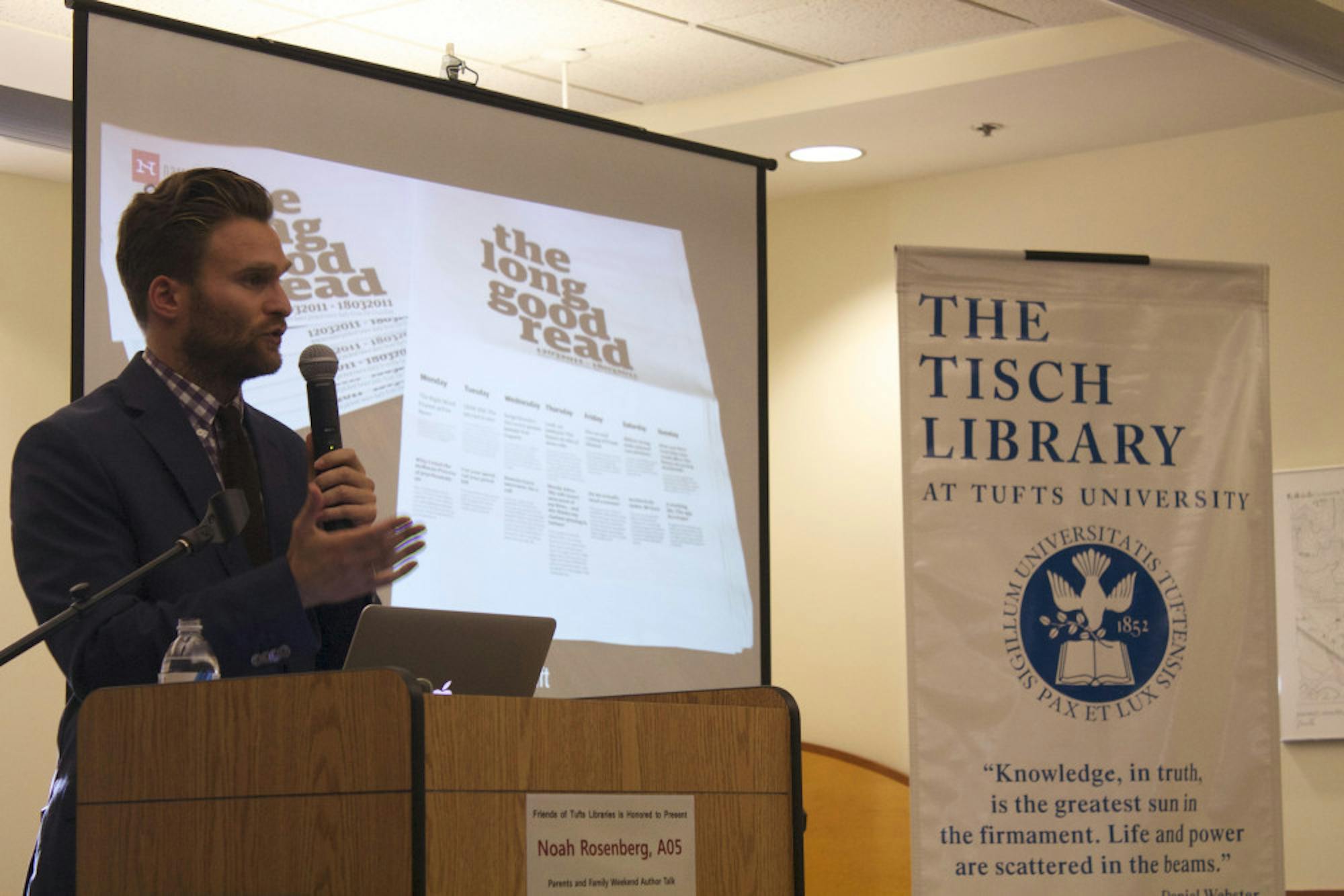Noah Rosenberg (LA '05), founder, CEO and editor-in-chief of Narratively, a web-based, narrative journalism platform, spoke about his career and the founding of the platform in a lecture titled "Human Stories Will Change the World," organized by Friends of Tufts Libraries for Parents and Family Weekend in the Hirsh Reading Room of Tisch Library, on Friday afternoon.
Rosenberg was introduced by Laura Wood, director of Tisch Library, who spoke briefly about his career, during which he worked for The New York Times, The Wall Street Journal, GQ, CBS Channel One News and New York magazine, among other publications. Wood called him an "entrepreneur and storyteller," noting his contributions toward journalistic innovation, and added that Rosenberg has been involved in different components of the journalistic process, including production, editing, photography and writing.
Narratively, which defines itself as "a platform devoted to untold human stories," releases one theme per week and one piece per day, according to Wood.
Rosenberg began the lecture by discussing the changing dynamic of journalism and the role that media plays today, noting that "media storytelling in general has evolved to a fantastically elaborate extent."
He discussed the current craze with "buzzword content," increased access to information and the hyper-connected contemporary world. Rosenberg added that new forms of media, which now have unprecedented access to large populations without significant costs through the expansion of the online sector, has redefined what constitutes a story, noting BuzzFeed as an example.
"What the heck is a story anyway?" Rosenberg asked the audience.
He listed a series of criteria that he finds most important for a real story, including its ability to make the reader think and question, pique curiosity or emotions, untangle complexities, teach something new or bring characters or ideas to life.
Rosenberg noted that during his time working as a journalist for different news outlets, he began to find himself increasingly interested in human interest stories, which have grown in popularity in recent years with platforms such as Humans of New York. These platforms are able to provide a snapshot into the lives of ordinary people.
"Stories of course are appearing in new ways, surprising ways," he said, adding that the new vehicles for expression seem to change every day.
Today, consumers have more and more options for how they choose to digest stories, according to Rosenberg.
He noted the growth in nonlinear ways of telling stories, with different formats and contexts and the use of new media, always looking to "push things in new directions."
Rosenberg explained that during his time working for major news outlets, he witnessed the constant drive for making headlines, getting quotas and meeting deadlines, rather than generating more in-depth stories that may require more time to put together.
"It was into that mix that I started thinking about my stance or my position in the future of the media atmosphere," he said.
Rosenberg added that he began finding that the little moments he would come across during his time as a journalist for bigger news outlets were bigger than back-page news, but weren't treated as such.
The technological shift of media and the growth of mobile news applications around 2010, as well as the philosophical shift toward more thoughtful and engaging material such as content on Salon, helped create an opening for a platform like Narratively, according to Rosenberg.
He explained that he began to reflect on where journalism was going, and it was then that he and a group of fellow journalists decided to come together to create a new platform that could serve as a destination for storytelling. In order to gauge interest in the concept and raise some initial capital, Rosenberg and the group of journalists began a Kickstarter campaign for Narratively in 2012, raising over $50,000.
Rosenberg noted that although the campaign was initially intended to be based solely out of New York City and eventually expand, the campaign sparked a broad interest in other cities from the beginning. The project now features a team of over 1,000 freelancers around the world.
"We like to connect with our neighbors, we like to connect with people halfway across the world," he said.
Narratively has been able to solve two keys issues in journalism, namely pushing back against the growth of news opinion and "clickbait" material, but also helping create a space for storytellers to publish their works, according to Rosenberg.
"We’ve seen some great results now," he said. "The engagement … is kind of off the charts."
Rosenberg added that Narratively has been able to augment its stories with creative uses of content, including audio, photography and video.
"We try to get creative with the way that we’re presenting stories," he explained.
Articles on Narratively have even taken to implementing comic strips if no photography is available, revealing an ability to tackle weighty subjects through illustrations, according to Rosenberg.
"So many of our stories are visual in nature or really begging to be developed visually," he said, showing a piece titled "Just Like Clock Work," which makes use of audio and photographs to tell the story of John Metcalfe, a clock repairman in New York City, as an example.
Today, more and more people are realizing the value of storytelling, according to Rosenberg. Narratively is able to leverage storytelling in unexpected ways, and it can bridge the digital divide and deliver stories to the masses, he noted.
Rosenberg explained that since its founding, Narratively has been able to "strike some interesting partnerships" in order to bring in additional sources of revenue and help increase attention for the initiative.
He concluded that the ultimate objective of the initiative is to showcase "ordinary people with extraordinary stories."
Tufts alum examines career, development of Narratively

CEO of Narratively Noah Rosenberg speaks to students and their parents in the Hirsh Reading Room on October 17, 2014 about the importance of storytelling.





